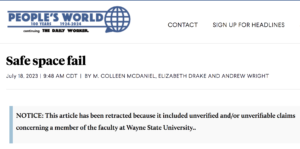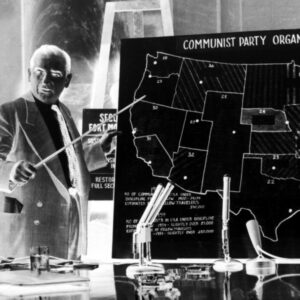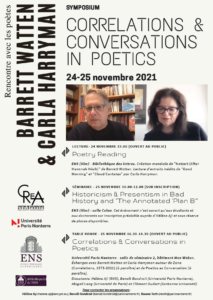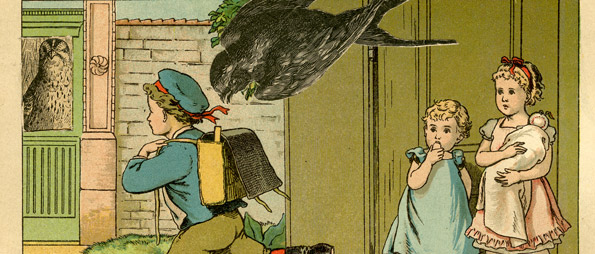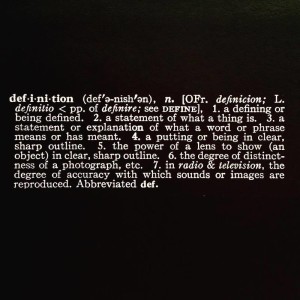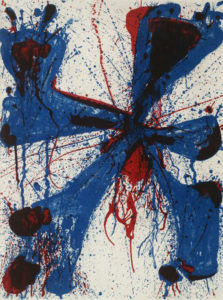
“How to think about being someone else’s antagonistic kernel; what does it mean to be someone else’s “Bad History”? The one objection I have to Dispatches principled statement is its glossing over specific controversies in poetics that pitted some against me over forty years, leaving the focus on me personally as the source of conflict.”
—“The Aye of Poetry”
“Damn, braces. Bless relaxes.”
—Blake, Proverbs of Hell
An article in today’s online edition of The Guardian, titled “1978: The Year that Changed San Francisco,” takes me back to the context for what many see as the originary moment of my literary career—the “Tribute to Louis Zukofsky” sponsored by the San Francisco State Poetry Center, shortly after his death earlier that year. I was asked by then-director Tom Mandel to provide the generational perspective of a new reader of Zukofsky’s work, in relation to canonical narratives of the New American Poetry in which Zukofsky figured as one of the grand masters of American epic in the Pound tradition. As has been much rehearsed, my language-centered, materialist reading—in both Marxist and textualist senses—claimed an “ethics of alterity” for Zukofsky’s nonidentity of signifier and signified, which I discerned in his translation of Catullus and that opened the way for a constructivist, rather than an expressivist, poetics. The contrast with the vatic induction into the grand tradition of the “author in eternity” could not be missed; a faultline in poetics opened up that threatened to swallow the audience whole; and they streamed out of the concrete auditorium of the San Francisco Art Institute as if their destruction were imminent. But there was a lot more going on that made this event a historical, as well as poetic, watershed, as The Guardian shows: the recent assassinations of George Moscone and Harvey Milk, the mass suicides at Jonestown, the passage of Proposition 13, the last concert of Sex Pistols and the rise of punk opened a breach in mass psychology that pushed historical antagonism toward political retrenchment in the 1980s.
Thus the Zukofsky tribute, as a watershed in poetics, condensed a historical moment that the values of language-centered, constructivist poetics would continue to negotiate in its development through the 1980s and beyond. In so doing, the epic tradition after Pound was reinterpreted through the “radical particularity” of the everyday in and as language—visible in the long-form poems of Ron Silliman, Bruce Andrews, Lyn Hejinian, and myself; in the site-specific performativity of Carla Harryman and Steve Benson; and in the quotidian lyricism of Kit Robinson, Ted Pearson, Rae Armantrout, and Tom Mandel (see The Grand Piano for retrospection on the politics and poetics of everyday life). The point is, however, that the negativity of “bad history”—the troubling undercurrents that transformed a benign discussion of poetry into a cataclysmic event—would remain attached to these poetic articulations as they took hold in the decades to come. However much “language as such” would be (mis)read as the contribution of Language writing in the late 1980s, there is, from the late 1970s on, a historical undertow or countercurrent that can never be dissociated from its politics of the signifier. Language writing, as I tried to show in Questions of Poetics, no matter how tied to the “presentism” of the signifier, is indissociably historical. The question remains, how to read that history in the defiles of particularity as not “mere” antagonism?
This gets us to the present, and the generational faultline that emerged as a new crux of historical and psychological meaning: the strife between “historicism” and “presentism,” caught between the trauma of post-millennial history and the amnesia of technological availability. The mere depthlessness of the postmodern has been converted to a “millennial condition” in which the present is the site of a radical historical paranoia, where any assertion of a preexisting context, particularly for the signifiers of poetry, is seen as a duplicitous shape-shifting. It is just such a generationally based interpretive dilemma, I believe, that brought my pedagogy at Wayne State University to a breaking point (and which I will try to describe in a subsequent post). But the immediate result of the presentist refusal to interpret historically is its effect on the narrative of my literary career, seen as a duplicitous “signifier” in its own right. To be specific, the antagonisms of 1978, or the Poetry Wars of the 1980s, or the reception and institutional history of Language writing through the 1990s, as well as its historical retrenchment after the Millennium—are all bound up in a confusing mass of antagonism and projection. History in the form of the signifier is deeply threatening—because the signifier has become the shape-shifting placeholder for evanescent threats and promises that it can only conceal. Literary controversies become the evidence of dark forces hidden under them, that the presentist must exclude to survive.
In trying to unlink the mass of projections that are being brought to my work and career, I found it useful to try to specify, localize, even periodize the sequence of literary controversies I have been associated with—but also to identify the areas of productive labor between them. This sequence is not “all antagonism, all the time,” as my brutalist critics have claimed [here]. While it is true I am known for literary controversies, or have been subject to them, my aesthetics and politics over decades have specific historical contexts. It is in the spirit of “unlinking” antagonism from events, in order to access the relation of the signifier of poetics to the signified of historical meaning, that I offer the following timeline:
1. 1975–80: the emergence of the Language school of poetry in San Francisco and New York. As editor of This, one of its major literary magazines, I achieved early notice for my editorial work as well as my poetry. NEA publication grants for a series of books under the imprint of This Press.
2. 1978: public controversy with Robert Duncan. This event has defined the negative public response to my work and views over a 40-year period; it has been much written about and commented on. In the same period, Proposition 13 led to the disfunding of public arts programs in California.
3. 1979: receipt of an individual fellowship from NEA, in an award cycle that was attacked for the prevalence of New American and avant-garde poets.
4. 1982–94: after the success of the Grand Piano reading series and Bob Perelman’s Talk series, I became a board member of 80 Langton Street/New Langton Arts and programmed numerous events over the next twelve years.
5. 1980s: the “Poetry Wars.” With the emergence of Language writing, there was a public reaction that led to inflammatory articles in journals such as The New Criterion, Partisan Review, Georgia Review, Poetry Flash, and elsewhere. The first wave of neoconservative attacks on the National Endowment for the Arts led to the defunding of literature programs.
6. 1982–98: co-editorship of Poetics Journal (with Lyn Hejinian) and numerous interactions, along with some dissensus, with poets and poetry scholars in this period.
7. 1984: Total Syntax published, the first book-length critical work by a member of the Language school; it was both well received and controversial.
8. 1984–94: work as editor for Representations, the flagship journal of “the New Historicism” at University of California, Berkeley.
9. Mid 80s: my ability to work in the San Francisco Bay Area was affected by the negative publicity I had received. I became an academic editor and moved toward the university in order to broaden my engagement with literary and cultural theory, eventually leaving the Bay Area community.
10. Late 80s: first anthologies and early critical articles of a broad but controversial reception of Language writing. The reception was split, however, between Left critics like Andrew Ross and Jerome McGann and modernist and formalist ones like Marjorie Perloff and Charles Altieri. Dissensus increased between New York-based Language writers and those on the West Coast.
11. 1989: began graduate work in literature at UC Berkeley. The second wave of neoconservative attacks on NEA led to the defunding of alternative spaces like New Langton Arts. During this period I published art criticism in San Francisco (Artweek), but managed to stay out of controversy.
12. 1994: hired at Wayne State University, in a department with many active faultlines, especially between literature and cultural studies.
13. 1993–2008: attended five “decades” conferences at University of Maine, Orono. From the beginning of my academic career I would present at scores of conferences in literature and cultural studies.
14. 1998: tenure at Wayne State. Publication of Bad History, a book-length poem dealing with historical trauma; and a collected poems, Frame (1971–1990).
15. 2000: public debate at the Orono 60s conference with African-American poet Amiri Baraka, an event that was much noticed and written on [here].
16. 2004: promotion at Wayne State. Publication of The Constructivist Moment and award of the René Wellek Prize. A finalist for the Gray Chair at SUNY Buffalo, which was contested both within and outside Buffalo. Also a finalist for two other major positions—chair at University of Minnesota and director of the 21st-Century Studies program at University of Wisconsin, Milwaukee.
17. 2006–10: editing and production of the “collective autobiography” The Grand Piano in ten volumes, which was well received by readers but generally ignored in terms of reviews.
18. 2010: conflict with faculty member Kathryne Lindberg, and her suicide later that year, which had a negative effect on my work at Wayne State University and outside it.
19. 2009–16: founding and co-organization of the Bavarian-American Academy summer exchange program in American Studies. My involvement ended due to controversies in American Studies and lack of internal support.
20. 2015: online literary controversy concerning the “avant-garde” and the politics of identity. I was mobbed and memed in this period even though I tried to write neutrally on these questions.
21. 2016: publication of Questions of Poetics, which addresses Language writing and its conflicted reception after 2000; six reviews to date.
22. 2018: online literary controversy with African-American poet Nathaniel Mackey, published without permission by Dispatches from the Poetry Wars, which also uploaded the tape of the 1978 debate with Duncan.
What this chronology seeks to establish is the sense in which my being controversial is not merely a question of person or personality but has literary and historical content. What is missing from the current campaign against me, then, is what is it about the work I do, the positions I take, my literary aesthetics and politics, that is perceived as antagonistic. My hope is that by unlinking the sequence and contexts for controversies in my work, each can be seen as historical in the sense I have discussed above at their originary moment. “Historicism” needs to ask “presentism” to take another look.
Links: Page 01: “Breaking My Own Story”
Page 02, “What Is Mobbing?”
Page 03, “The Aye of Poetry”
Page 05, “Questions of Unreason”
Page 06, “Defend Louisville!”
Page 07, “Difficult Speech @ Louisville”
Page 08, “Nonsite Speech”
Page 09, “Archive News”
Page 10, “Public Documents”
Page 11,” “Endgame Notes”
Image: Sam Francis, Damn Braces, 1960.

